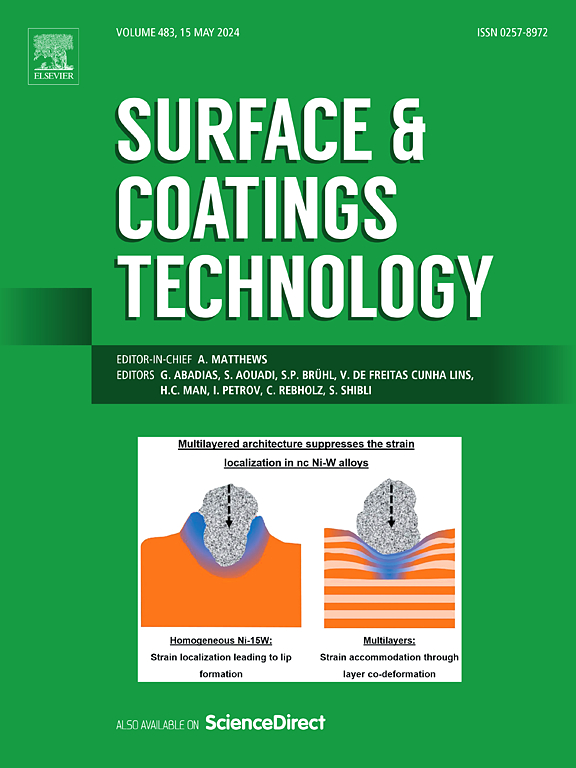通过硼化、铝化和硼铝化处理 Inconel 718 合金涂层的高温抗氧化性
IF 5.3
2区 材料科学
Q1 MATERIALS SCIENCE, COATINGS & FILMS
引用次数: 0
摘要
Inconel 718 合金用于高温环境,容易与氧气发生反应,导致高温性能下降。为了提高 Inconel 718 合金的高温抗氧化性,本研究通过渗硼、渗铝和渗硼渗铝在 Inconel 718 合金上制造了三种涂层,并研究了其在 800 ℃、900 ℃ 和 1000 ℃ 下的高温抗氧化性。结果表明,涂层的最大厚度可达 200 μm。此外,这三种涂层都能提高 Inconel 718 合金的高温抗氧化性,其中硼铝涂层的高温抗氧化性最好。此外,耐高温氧化性提高的原因是在氧化过程中形成了致密的氧化层,这可以防止进一步氧化。本文章由计算机程序翻译,如有差异,请以英文原文为准。
High-temperature oxidation resistances of coatings on Inconel 718 alloy by boriding, aluminizing, and boroaluminizing
Inconel 718 alloy is used at high temperatures and is prone to react with oxygen, leading to a decrease in its high-temperature performance. To improve the high-temperature oxidation resistance of Inconel 718 alloy, in this work, three coatings on Inconel 718 alloy were manufactured by boriding, aluminizing, and boroaluminizing, and the high-temperature oxidation resistances at 800 °C, 900 °C and 1000 °C were investigated. The results showed that the maximum thickness of coatings can be achieved >200 μm. Moreover, these three coatings can improve the high-temperature oxidation resistance of Inconel 718 alloy, and the boroaluminized coating has the best high-temperature oxidation resistance. Besides, the reason for the improvement of high-temperature oxidation resistance is due to the formation of dense oxide layers during the oxidation process, which can prevent further oxidation.
求助全文
通过发布文献求助,成功后即可免费获取论文全文。
去求助
来源期刊

Surface & Coatings Technology
工程技术-材料科学:膜
CiteScore
10.00
自引率
11.10%
发文量
921
审稿时长
19 days
期刊介绍:
Surface and Coatings Technology is an international archival journal publishing scientific papers on significant developments in surface and interface engineering to modify and improve the surface properties of materials for protection in demanding contact conditions or aggressive environments, or for enhanced functional performance. Contributions range from original scientific articles concerned with fundamental and applied aspects of research or direct applications of metallic, inorganic, organic and composite coatings, to invited reviews of current technology in specific areas. Papers submitted to this journal are expected to be in line with the following aspects in processes, and properties/performance:
A. Processes: Physical and chemical vapour deposition techniques, thermal and plasma spraying, surface modification by directed energy techniques such as ion, electron and laser beams, thermo-chemical treatment, wet chemical and electrochemical processes such as plating, sol-gel coating, anodization, plasma electrolytic oxidation, etc., but excluding painting.
B. Properties/performance: friction performance, wear resistance (e.g., abrasion, erosion, fretting, etc), corrosion and oxidation resistance, thermal protection, diffusion resistance, hydrophilicity/hydrophobicity, and properties relevant to smart materials behaviour and enhanced multifunctional performance for environmental, energy and medical applications, but excluding device aspects.
 求助内容:
求助内容: 应助结果提醒方式:
应助结果提醒方式:


